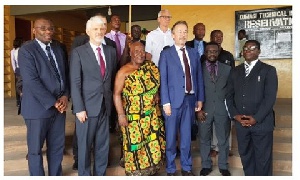Business News of Monday, 6 February 2017
Source: 3news.com
EU commits €7m to Skills Development Initiative III
The European Union has committed €7 million to support the implementation of the third phase of the Ghana Skills Development Initiative (GSDI3).
The Initiative, implemented by the German development agency, GIZ, and the Council for Technical and Vocational Education and Training (COTVET), seeks to improve the quality of apprenticeship within the informal business sector to enhance skills and qualification.
The Ghana Skills Development Initiative has been implemented in three regions – Greater Accra, Volta, and Northern regions – to enhance the skills of beneficiaries in five trade areas of electronics, garment, welding, cosmetology, and auto mechanics.
The project supported the introduction of competency-based training standards and cooperative training models at selected TVET training providers.
Following the success of the project, the European Union has partnered with GIZ to inject €7 million to expand the initiative to three additional trade areas and three additional regions.
German Ambassador to Ghana Christoph Retzlaff said Germany has contributed more than €1.5 billion to Ghana’s development.
“Since 1863, Germany has contributed more than 1.5 billion Euros to Ghana’s development in the area of Good Governance, Agriculture, and Sustainable Economic Development.”
He noted the Ghana Skills Development Initiative which started in 2012 is geared towards job creation for the youth. “Germany has the second lowest youth unemployment rate in the European Union and this is largely due to our dual vocational training.
This is the reason why we want to strengthen and support the development of Technical and Vocational Education training in Ghana to help the country solve its increasing youth unemployment challenges.”
He pledged the continuous support of the German Government to Ghana’s development.
The European Union Ambassador to Ghana, William Hanna, lauded the project as an effective way to solving youth unemployment.
“EU is supporting the Ghana Skills Development Initiative with an amount of 7 million Euros and will continue to offer its support to initiatives that empowers the youth to be economically sustainable.”
Executive Director of COTVET, Sebastian Deh, commended the EU and the German Government for the continuous support in the area of skills development. The delegation from German Government and European Union took a tour of Kumasi Technical Institute (KTI) and interacted with some of the students engaged in the training activities.
KTI is one of the training providers which introduced competency based training courses for apprentices as part of the developed cooperative apprenticeship training system.
Opinions










